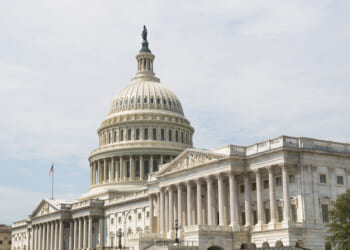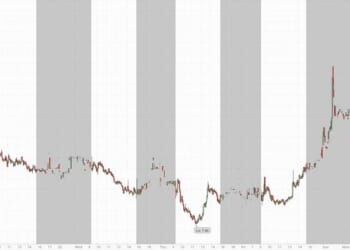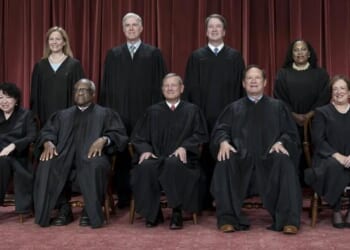Editorial note: this essay originally appeared at The Giving Review.
***
Liberal political theorist Laura K. Field’s new Furious Minds: The Making of the MAGA New Right examines the intellectual defense and promotion of the populist conservatism ascendant in America since 2016. While it does place those intellectuals’ thinking in some historical context, harkening back to their pre-2016 predecessors, most of the book explores their output and activities between ’16 and ’24.
“My core purpose is not to examine historical precursors to the New Right; I focus on the intellectual world that has grown up under the cover of Trumpism more than on the intellectual roots of these changes,” according to Field. As much as Furious Minds looks into the intellectual underpinnings of the current populism, then, it really looks in much more depth at what are relatively recent intellectual overlays on it.
As a former program staffer at a conservative private-foundation, I (arrogantly and) reflexively assumed any work with a subtitle promising to tell about “the making of” anything—but especially conservative intellectualism—would have philanthropic funding flows as an important part of its story. “I focus squarely on the intellectuals and ideas behind right-wing populism,” though, Field helpfully announces early on in the book. Less attention is given to several other specifically listed factors related to it, including “following the money.”
Here too, then, the pre-/post-’16 line matters. Donald Trump’s unexpected electoral success that year cannot plausibly be credited—even indirectly or in effect—to any overarching intellectual infrastructure created, nurtured, or maintained by conservative philanthropy. In fact, in very large part, it reflected voters’ “primal-scream” reaction against what was then the conservative intellectual infrastructure, among many other of the country’s institutional “pillars.”
So, there could really be no mythologizable, pre-‘16 “Powell memo” for Field to find in any case. No “Horowitz report.” No top-down plan of the monied to make best use their tax-advantaged giving instruments. Almost of the rich on the right and those who work for them were as caught off guard by Trump as everyone else.
What happened and is happening
Post-’16, New Right intellectuals have engaged in mostly earnest searching for the right questions to ask and the best answers to consider in the wake of what happened and is still happening. Furious Minds shows they have been doing so from academia, positions at newly created nonprofit think tanks that we’ve tried to track here, and perches at previously existing nonprofits with worldviews newly informed and influenced by the changed circumstances—almost all with also-earnest, forward-looking philanthropic funding. But again, not any pre-’16, Powell-memo-like top-downness.
Field places these intellectuals into three categories. They are: those with the nonprofit Claremont Institute, founded in 1979; Postliberals; and National Conservatives, organizationally exemplified by the nonprofit Edmund Burke Foundation, which was founded in 2019 and puts on the NatCon conferences. She appends a somewhat-amorphous category for what she labels a “Hard Right Underbelly” of, well, (less- or non-earnest) cranks and weirdos are in one or more of the three classifications.
“Each group of the MAGA New Right,” according to Field,
offered a full slate of positions … but each camp worked toward its own hard restorationist’s view of the future. The Claremonters said they wanted a return to the vision of the Founders—a small-government Republican vision that respects traditional religion, many statesmanship, self-government, and federalism. It that didn’t work, then Red Caesarism would have to do. The National Conservatives sought to protect the true American nation—a Christian, mostly white, socially conservative nation, and one where hordes of woke neo-Marxists would be defeated for good. For the American Postliberals and Catholic integralists, the ultimate endgame was spiritual; the secularist enemies would be defeated for the sake of the common good, which included orderly hierarchical politics, economic melioration, and the soul’s salvation. The Hard Right wanted to smash the liberal status quo, come what may.
By my count, her book references roughly 70 new and old philanthropically funded think tanks, magazines and journals, and higher-education groups. As she promised, its mentions of grantmakers are much less numerous, but they can provide insight to any reader who failed at finding more-fulsome funding-flow information. Given that failure and giving in to cynicism, they may offer potential portent to any future chronicler, liberal or otherwise, looking to find donor-driven underpinnings, “dark” or ill-motivated or impressive or effective or not, for populist-conservative intellectualism.
Particular potential portents
“One of the most frustrating things about politics today—and here I am thinking about the New Right mainly, but certainly not exclusively—is the amount of money, energy, and talent that it churns through, wasted, when there is always so much to be done,” Field writes, for example.
Whether she thinks it wasted or not in this particular case, some of that money came from NatCon speaker Peter Thiel—who’s featured in Furious Minds as both a thinker and a funder, representatively including of the Edmund Burke Foundation, the Journal of American Greatness, American Affairs, the New People’s Cinema Club, and the work of Patrick Deneen and Curtis Yarvin. While not mentioned in the book, Thiel has also supported the online magazine American Greatness, founded in 2016 by former Claremont intern Chris Buskirk.
For another example, after summarizing a Winter 2019 Claremont Review of Books essay by NatCon chairman Christopher DeMuth, Field notes a question about conservative givers—in this instance, definitely New Right-relevant. Specifically, as she describes it, DeMuth’s piece recommends
more financial transparency and accountability. This turn to financial responsibility at the end of the essay, in particular, prefigured schisms that would later affect the movement. The lingering question would be whether American conservatives—so long enamored of “Reaganomics” and highly dependent on an elite and wealthy donor base—could reassert themselves on a different set of economic presuppositions.
A decidedly different set of economic presuppositions than those when soon-to-be Supreme Court Justice Lewis Powell wrote his 1971 memo to a U.S. Chamber of Commerce official about the need for a conservative intellectual infrastructure, well-funded enough to be maintained for long enough to matter in policy and politics.
Elsewhere, Field covers some of writing and speaking of Claremont supporter and chairman Tom Klingenstein, who also funds NatCon. Regarding Claremont itself, she writes, it “has certainly benefited from its populist pivot. Its profile rose sharpy, in some quarters, since its turn to Trumpism, and its donor base expanded.”
In a non-grantmaking context, Field also mentions Vivek Ramasamy’s founding of Strive Asset Management—a firm to explicitly counter the pro-ESG and -DEI investment activities of BlackRock, State Street, and Vanguard—“[w]ith support from Peter Thiel, Bill Ackman, and JD Vance,” she writes. “By September 2023 it had raised over a billion dollars.”
Beholdenness and the base
In writing about the effects of the war in Ukraine on New Right thinking and activities, “[g]enerally speaking, those on the new right who formed the activist arm of the movement (and so also those who were more beholden to donors and the right-wing base) tended to side with Ukraine and the American establishment’s support for it,” according to Field. “Those who were more intellectual and aloof tended to hold back from overt support for Ukraine and instead expressed an isolationist’s skepticism about engagement abroad that seemed much truer to the original spirit of the New Right ….” So, what might be a different set of presuppositions in foreign policy, too.
In the political context, she writes at one point, the Postliberals “are not beholden to GOP donors, or to the GOP base. Which means that, with the exception of their influence on JD Vance, they have been the least influential thinkers of the New Right.”
At other points, she tells of Linda L. Bean’s support for a new Intercollegiate Studies Institute conference center (parenthetically) and calls the American Enterprise Institute headquarters “one of those places that feels overflowing with money: The building is gorgeous and the art is real.”
(At yet another, earlier point in her brief setting of historical context, again parenthetically, Field quotes William Regnery II complimenting his own bankrolling of certain white nationalist initiatives to Buzzfeed in 2017. “My support has produced a much greater bang for the buck than either the brothers Koch or Soros Inc.,” Regnery said.)
Presuppositions, old and new, and perceptivity
Just as Furious Minds was released, The Washington Post published a lengthy article by Elizabeth Dwoskin profiling what it called the secretive Rockbridge Network and its founder Buskirk—who also co-founded the 1789 Capital asset-management firm, with Omeed Malik.
The Rockbridge Network began at a meeting in Rockbridge, Ohio, convened by Thiel and Vance in 2019, three years after Buskirk started American Greatness. It included Buskirk, “hedge fund heiress Rebekah Mercer, then-Fox News host Tucker Carlson and economist Oren Cass, according to two people familiar with the meeting,” Dwoskin reports.
In addition to Thiel and Vance, Cass is also featured in Field’s book. Cass founded the American Compass group the year after the first Rockbridge meeting. It has the different set of economic presuppositions about which Thiel has recently spoken to The Free Press and to which DeMuth alluded, as Field notes, in The Claremont Review in 2019, and it has a wider set of financial supporters than groups with what might be considered the old presuppositions.
Buskirk and Mercer do not appear in the Field narrative, nor does Rockbridge. “Relatively unknown outside his rarefied circle of business leaders and tacticians, Buskirk is an unusual figure to step into a role once dominated by the Koch brothers, the deep-pocketed Republican megadonors who have opposed many of Trump’s trade policies,” the Post’s Dwoskin writes (link in original).
Buskirk “is not a meme-throwing MAGA firebrand; friends describe Buskirk as a dogged tactician who is fiercely perceptive. He was ‘the first mover’ to recognize that there were going to be thousands of well-off people who ‘no longer felt at home in the Democratic Party,’” Dwoskin continues, quoting Malik. In a statement to Dwoskin, Vance also approved of Buskirk and his work.
A cynical surmise
If again giving in to cynicism, one might surmise that Rockbridge or something related to it could attain the level of “Powell-memo”-like mythology in any future progressive accounts of philanthropy’s and funders’ roles in “the making of” what happened and is happening now in America.
In the meantime, even just a mere skeptic, perhaps reverting to reflexiveness, can conclude that philanthropy actually plays a much-larger role in Field’s Furious Minds than either she or a reader might first think. Monoculturally progressive establishment philanthropy has long been and is a big part of—basically, “picking up the tab” on—the elite managerial class against which Trump voters and New Right intellectuals were and are supposedly so furiously reacting.











